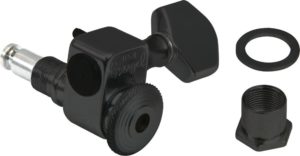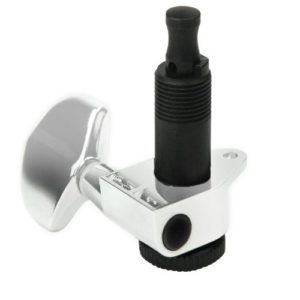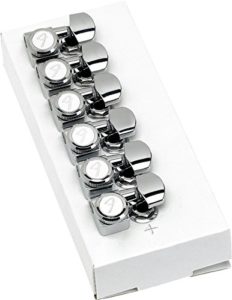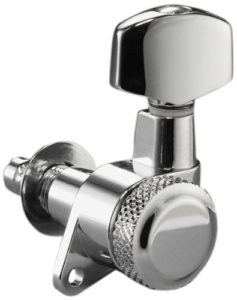Are you looking for the best locking tuners? Then, you’re in the right place.
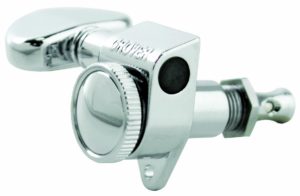
Talk to any person who has experience with guitars and basses, and ask them what’s most frustrating about an instrument – what gives them the most problems.
The chances are excellent that they’ll say the “neck action” is sometimes too high on less expensive guitars. They may also point out that the electronics of the guitar should be “silent.” There should be no hum or other unwanted noise when equipment is plugged in and turned on.
You may also find a few players who will mention the tuners on a guitar as a possible source of the difficulty. Fortunately, when you spend a bit of extra money to get a mid-priced or professional-level instrument, this does not often occur.
With less expensive guitars, however, tuners can be a real issue. The general idea behind performing on a string instrument is to produce a sound in tune and pleasing to the ear.
So, without further ado, let’s try to understand what the best locking tuner is.
Top 5 Best Locking Tuners:
Grover 502C Roto-Grip Locking Rotomatic Tuners (Editor’s Choice)
Like Schaller, the Grover name is widely recognized in the music industry. Some experienced guitarists look for the name of tuners when they buy a particular guitar.
This locking tuner requires a one-time string wrap, but a thumbscrew can then lock it in place. The design is intended to make this an easy replacement for traditional machine heads.
With the chrome finish and traditional-looking tuning knob, you’ll get the appearance you want, in addition to the reliable function of a quality tuning machine.
Pros
- Tuning ratio excellent
- Chrome, gold, black chrome options
- Definitely the best locking tuners for Les Paul!
Cons
- Problems with defects with one or two units, but rare
- It won’t accept extra-large strings.
We recommend this model to all happy owners of Les Paul guitars. If your Epiphone has modern tuner holes, these should be a suitable replacement. However, the set screw may not line up depending on the orientation of your current tuning machines. Also, occasionally tuner holes have to be widened slightly.
Sperzel 6 In-Line Locking Tuners
Like all these high-quality locking tuners, the Sperzel is sure to give you the performance you need and deserve. The name may not be quite as recognizable as Grover, Fender, etc. Still, these are professional-grade machine heads from a company that often supplies tuners to brand-name guitar manufacturers.
This product is marketed as a 6-in-line locking tuner and as hassle-free hardware to improve tonal response. In addition, tuning posts are staggered in height, so you won’t necessarily need to use string retainers.
Pros
- Holds tune very well
- Easy installation
Cons
- Loose feel
- Some problems with removable pin
Planet Waves Auto-Trim Tuning Machines
These tuning machines are brought to you by a company that has established a good reputation among musicians. They do have the unique feature of being designed to cut the excess string with the guitar automatically is tuned.
The clamping method means you don’t have to do multiple wraps around the post. The Planet Waves tuners have an 18:1 gear ratio for smooth and accurate operation.
They come with a lifetime warranty and work well with tremolo guitars. You’ll appreciate the appearance and feel as well.
Pros
- Tight construction
- Smooth gearing
Cons
- Problem cutting larger strings
Fender Locking Tuners – Best Locking Tuners for Stratocaster
It’s hard to find something not to like about locking tuners from one of the guitar world’s icons. The company has continued its traditional look, with a design similar to the standard tuners on Fender guitars.
Naturally, they should be an easy replacement for standard tuners on Fender guitars.
Pros
- Fender tradition
- Direct replacement on Fender guitars
Cons
- Fitting to some guitars
- Loose operation with some units
It’s also easy to understand why we think these are the best locking tuners for Struts.
Schaller Locking Tuning Machine Heads
The Schaller name has long been synonymous with quality guitar parts, especially with traditional winding tuners. The company now produces a locking tuner to lock the string in the peg with a knurled nut.
This company’s patent has a long history, about 20 years. The mechanism works much like a classic tuning head, but the string isn’t wound around the peg.
Just insert the end of the string through the hole with the screw loosened, lock the string with the clamp/screw and move on. Again, Schaller designs in reliability with a ball-socket concept, even with a tremolo. The locking mechanism works like similar top-locking designs, but the string is locked from the bottom.
Pros
- Hold tune well
- Solid construction
Cons
- Some problems with individual units out of the box
- Fitting to specific guitars
How to Find the Best Locking Tuners: Buyers Guide
The traditional/classic term used to refer to this part is “tuning peg.” An essential part of any string instrument, the tuning peg is used to tighten and loosen the string – to change the pitch. While this seems to be extremely basic and shouldn’t present a problem, the truth is different.
With modern guitars, specifically, the tuners are no longer just pegs, as they are with acoustic instruments such as the violin and cello.
It’s more accurate to call them tuning machines since the best of them use a gear arrangement (sometimes enclosed) to make tuning a guitar or base more efficient and accurate. Pegs for some larger acoustic instruments, such as the double bass, also used geared tuners.
Some less-experienced individuals may now be asking why tuning machines are dealt with separately. They may ask, “Isn’t this just a part that’s included when you buy the guitar?”
The answer to that question is, “Yes.” But, as mentioned earlier, there are times when the tuning machines lack quality and don’t perform the task they’re meant to.
Basic Problems
It’s essential to repeat this: you shouldn’t have to worry about the tuners when you buy a quality guitar or bass. Tuners should be firmly attached and operate smoothly when you tighten or loosen the strings. If they don’t, you should talk to the seller or consult with someone knowledgeable in guitar repair.
We can now turn to the real focus of this review article – the best guitar locking tuners. Many guitar players and bass players will rely on the standard tuning machine’s design quality, those attached to the guitar when purchased. But some players find they need to take reliability to the next level and install locking tuners.
Locking tuners have a pin or screw that clamps down on the string to keep it in place. That can eliminate the need to wrap the string around the peghead, reduce tuning problems, and make string change more efficient.
That is a relatively new idea, but if you’re considering changing to locking tuners, remember they don’t guarantee your guitar will stay in tune.
The Benefit of Locking Tuners
What this type of tuner will do is lock your string to the post, so your guitar won’t go out of tune because it slips or unwinds. That’s a significant difference. However, it may still go out of tune due to stretching or using the tremolo bar (whammy bar). Many guitar players and designers say the tremolo bar is the main reason for using locks on your tuning pegs.
Winding is the most consuming part of replacing strings. The choice of locking tuners will save you time, as mentioned earlier. These have been part of premium guitars and custom guitars but are also starting to show up in the mid-price range.
You will be adding a small amount of weight, and you will have more parts to keep track of. Price may be an issue if you’re on a budget.
That is not the right choice for everyone, so take some time to find tuners of high quality. Then, if they’re worth the investment and work for you, you’ll know soon after you install them.
Now that you have a general idea of what locking tuners can and can’t do for your guitar, it’s time to look at a few of the top products in this category. You’ll find some familiar names on the list, along with a couple of manufacturers you may not have heard of.
Conclusion: What Are the Best Locking Tuners on the Market?
Now that you’ve had a chance to read about what traditional tuners do for your guitar and about what locking tuners can do for your guitar, you should have enough information to decide if this is the right path for you. For many years, manufacturers of quality guitars have supplied tuning machines that work very well almost all the time.
There will be issues with any mechanical design, though you should expect to get flawless performance when you invest in a top-shelf guitar. Any of the products reviewed can work for you if you believe you need to change locking tuners.
One of the primary benefits will be the time saved when changing strings or replacing a broken string. Unfortunately, that is a serious issue for performing guitarists since a broken string can bring the show to a halt unless you’re fortunate enough to have another guitar ready.
If you’re a regular user of the whammy bar, you may want to look more closely at locking tuners as an option. But keep in mind that this is not a guarantee that your guitar will stay in tune.
You should have good luck with any of the five companies mentioned here since they all have a strong reputation. Good luck and have fun playing guitar.
